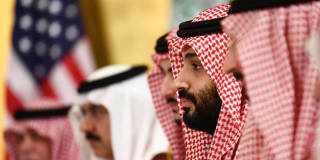Joe Biden’s administration came into office determined to treat Saudi Arabia as a “pariah,” partly because the US believed that Crown Prince Mohammed bin Salman had approved the murder of Jamal Khashoggi, a prominent journalist. Now Biden seems to be reversing course – and rightly so.
NEW YORK – Several recurring debates animate foreign policy. The most basic is how much foreign policy to have, or how to strike the right balance between addressing domestic issues and problems abroad – in extreme form a debate between isolationism and internationalism. Then there are debates over tools (diplomacy versus sanctions or military force) and means (unilateralism versus multilateralism). In some countries, there are also debates over how foreign policy should be made and carried out; in the United States, for example, this debate involves the role and powers of Congress versus those of the president and the executive branch.
For democracies, though, there is an additional debate over goals. To what extent should foreign policy seek to shape other countries’ internal characteristics, namely by promoting the spread of democracy and human rights, rather than focusing on influencing other countries’ external behavior in an effort to promote hard interests such as security and trade. Call this the debate between idealism and realism.
This is an eternal debate for US leaders and policymakers. Take the case of Saudi Arabia. Relations between the two countries had for three-quarters of a century been mostly cooperative, above all on oil-related matters: In exchange for the Saudis pumping copious amounts (thereby reducing price pressures), the US provided the advanced arms and intelligence the Saudis required for their security.

NEW YORK – Several recurring debates animate foreign policy. The most basic is how much foreign policy to have, or how to strike the right balance between addressing domestic issues and problems abroad – in extreme form a debate between isolationism and internationalism. Then there are debates over tools (diplomacy versus sanctions or military force) and means (unilateralism versus multilateralism). In some countries, there are also debates over how foreign policy should be made and carried out; in the United States, for example, this debate involves the role and powers of Congress versus those of the president and the executive branch.
For democracies, though, there is an additional debate over goals. To what extent should foreign policy seek to shape other countries’ internal characteristics, namely by promoting the spread of democracy and human rights, rather than focusing on influencing other countries’ external behavior in an effort to promote hard interests such as security and trade. Call this the debate between idealism and realism.
This is an eternal debate for US leaders and policymakers. Take the case of Saudi Arabia. Relations between the two countries had for three-quarters of a century been mostly cooperative, above all on oil-related matters: In exchange for the Saudis pumping copious amounts (thereby reducing price pressures), the US provided the advanced arms and intelligence the Saudis required for their security.